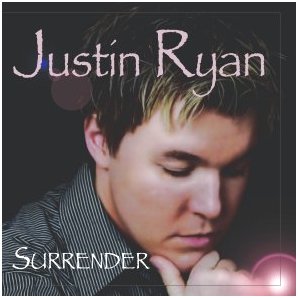
November 2006 Script

Christian Andreason - Show Me In Red (2005)
This is Queer Voices on KPFT and this segment is called Queer Music Heritage. I'm JD Doyle and tonight's show will focus on Gay Christian Music. Okay, that's the short title. On this show I will showcase Christian music by GLBT artists, and this will itself cover various music genres and span several decades. I believe this genre has been very neglected and I hope to show the richness of this music. My feature interview is with Marsha Stevens, often called the Mother of Contemporary Christian Music. I could not begin to do a show like this without her, and we'll get to that interview in just a while.
I started the show with the song "Show Me In Red" by Christian Andreason. That's from his 2005 album "The Rhythm of Life," and I think it captures fairly well the attitude of GLBT artists singing to God. I asked Christian to talk about how he wrote that song.
Christian Andreason: The reason why I wrote that song was because one day I was in my truck, driving home, and I heard this radio program called Dawson Live. And after a few minutes I surmised that it was a Christian radio program, call-in show. And the topic that night was homosexuality and Christianity. Well, about a couple of minutes later this kid called in. I would say he was no more than about 15 or 16 years old. And he was talking about how he believed inside of his heart that it was possible for him to be a Christian and be gay at the same time. He said that he had really found a beautiful peace with God, in his sexuality and also in his sexual orientation. Well, this guy, Dawson, proceeded to hammer this kid and tell him that he was no greater than a murderer or a rapist and that he was going to Hell. And basically what he did was he took this kid's beautiful spark of light…I mean he just brought the kid into just tears. And by the time they hung up, I mean, I just knew, you know what? This guy could be putting this kid in a body bag tonight. And I thought about all the other people, that were listening in, and believing what this, this man of hate, who was representing Christianity, was saying to this kid, and believing that it was true, and it just made me so angry that I ran home. And, I didn't know what else to do but get on my piano and write. Best form of social action that I could think to do, just write a song. So that's what I did. That's where "Show Me In Red" came from. And I know that the only way for any of that to change is for those of us who have stood in the light and saw the light, and have also acknowledged ourself to be self-affirming, and let other people see us be that way and set an example. You know, that's what "Show Me In Red" is all about.
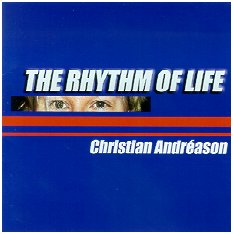
If you define the music on tonight's show as Christian music done by openly gay, lesbian, bi and transgender artists, then this field of music probably starts in 1987, when Marsha Stevens released her first solo album after coming out.
But I want to go back to the 1950s for two very different artists. One was not really known for his singing, and the other was much more famous for other types of music.
Bayard Rustin should be famous as being one of our gay heros, but the gay angle was very much played down during his 1950s and 60s civil rights activism. And Rustin was a master strategist, perhaps best remembered as the organizer of the 1963 March on Washington, one of the largest nonviolent protests ever held in the United States. He was a key advisor to Martin Luther King Jr and helped influence King in taking a peaceful approach to the Civil Rights movement. Despite these achievements he was fired from important leadership positions, largely because he was an openly gay man in a fiercely homophobic era.
And he was also a singer of gospel music, and in the early 50s recorded an LP called "Elizabethan Songs and Negro Spirituals." Two of his spirituals were "Ezekial Saw the Wheel" and "Lonesome Valley."
Bayard Rustin - Ezekial Saw the Wheel / Lonesome Valley (1950s)
I said I had two artists from the 50s, and Johnnie Ray was certainly one of the most popular artists of those years. He was not known for religious music, but when you think about his style it's easy to see that he was very influenced by gospel and R&B. Here's a song from his 1958 album, "Johnnie Ray in Las Vegas."
Johnnie Ray - I'm Gonna Walk and Talk with My Lord (1958)
Johnnie Ray and "I'm Gonna Walk and Talk with My Lord." Ray died in 1990 at age 63.
San Francisco Gay Men's Chorus - Behold Man (1981)
When choosing music for this show, I was well aware of the many gay & lesbian chorus albums containing religious songs. But as the focus of most of those choruses is not on religion I felt they generally did not fit, but I'm making an exception for this group. The San Francisco Gay Men's Chorus was the first gay chorus to record an album, in 1981, appropriately called "The San Francisco Gay Men's Chorus Tours America 1981," and the song you heard was "Behold Man."
Starting around 1974 and for the next ten years one of the most important voices of the women's music movement was Meg Christian. In 1984 she decided to leave the music scene and devote herself entirely to the spiritual life. She joined a yoga community that embraced the spirituality in all religions, and therefore she was comfortable performing prayers from many faiths, including her version of "The Prayer of St. Francis."
Meg Christian - Lord Make Me an Instrument (1998)
What an amazing
voice, Meg Christian.
I'm very pleased now to bring you an interview with Marsha Stevens and
I want to begin with the song that started it all for her. When she was
16 she wrote "For Those Tears I Died," also known as "Come
to the Water," and it quickly became a hit in the blossoming field
that was to become Contemporary Christian Music. She recorded the song
in 1970 as a member of the group Children of the Day.
Children of the Day - For Those Tears I Died (1970)
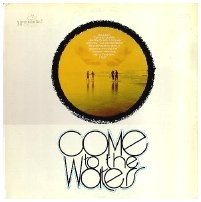
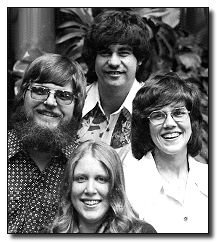
How did you get your start in music?
Well, I sang with my kid sister when I was little. We actually got a job as troubadours, when she was 11 and I was 14 at a local restaurant. I just hung a guitar around my neck and they paid us to walk around among the tables singing, you know, old folk songs, and Mitch Miller songs, and Peter, Paul & Mary stuff, and whatever. So, we were doing that just before we became Christians, and it was actually the first time I'd sung in public, as opposed to the dog and pony show for when my parent's friends came over.
This was during the folk era.
Oh, yeah, very….well, not only was it during the folk era it was like…I was born in '52 so that would have been, like '66, but also, I wasn't allowed to listen to anything but folk music. My parents had real strong issues against rock & roll, so they brought me home Mitch Miller and Up With People, and of the two I preferred Mitch Miller, cause Up With People was just way too dorky for me to be able to handle
You've been called the Mother of Contemporary Christian Music…what does that actually mean and why is that said?
Well, it's certainly not because I'm the most prolific, or the most well-known. It's just that the very first song that I wrote, "For Those Tears I Died," happened to be the first song that fell into that genre of Contemporary Christian Music that was published, and so because I just happened to write it at the time when, of course it wasn't even named Contemporary Christian Music when I wrote it, I just happened to write it at that time, and it was the first song that sort of, you know, went around the world, and got translated into different languages and so the people who were writing the history of the era said, well, you know, she wrote the first song, and she sang in the first group that was called a Contemporary Christian group, so that's what the guy who wrote the encyclopedia of Contemporary Christian Music dubbed me. I thought it was pretty cool, I was honored.
I did a google search on just the phrase "Mother of Contemporary Christian Music" and found about five pages of listings, and all of them are you.
Well, see, there you go. To me it was really a chance of fate, I mean, not that I don't think it was God-designed, I just…I happened to write at a time that there was a big change-over in music styles in the Christian community and so I was the first one that was published and in the first group that was called that. So it wasn't because I was the most important or the best or most prolific. I was just the first
I know that a lot of my listeners know this story, but for those who don't I would like to hear about the song "For Those Tears I Died" and what happened after that.
It was weird to write that first song. Naturally I wrote it for strictly personal purposes. All my friends were hippies and back then you didn't get high to get loaded, you got high to expand your minds. And so being able to talk about ideas was a big deal, and I kind of hit upon the idea of writing a song about my experience with Christ, cause it would seem less hackneyed to my kid sister and my friends if I would put it my own words and had my own thing about it. As it happened I had never written a song before, but I knew four chords on the guitar, so hey. And I listened to like I said a lot of folk music so I sort of patterned it after that. And I sang it for my kid sister and my friends at school, and really I was done with it.
I was astounded that people started to sing it. I had no idea that that would happen. In fact it was only two weeks later that I had a friend call me back and say, "Oh I heard this great song at church and I know you're into music, so you'll love this song," and she sang me my song. And about a month later Pat Boone called my house, actually physically called my house. I picked up the phone and it was Pat Boone on the phone. To me, I wasn't even aware that he was still living; he was somebody that my mother listened to. And he asked if he could sing my song, and I thought, well heck, sure, go ahead. And you know the song really just took off without me. It went around the world. I got translations of it in about…I think at one point I had it in about 12 different languages. It was just like a huge reaction to that song.
And that was my senior year in high school, and I got a scholarship, a music scholarship to Bible college, and as it happened the choir in the Bible college was touring Europe and Israel that year. So because the other people in the group and I were there on scholarship, they allowed my kid sister who was also in the group to come with the choir. And so we would sing in the choir and then in the interim the group would sing. So that meant that the group got heard all over Europe and we opened for Billy Graham at the First Jerusalem Conference on Biblical Prophecy. By the time we got back to Norway Kathryn Kuhlman called and flew us home to do a TC special. You know, it just sort of took off. It was like a whirlwind. You know how at 16 you don't have any idea of what's normal or not in the world, so I didn't quite realize exactly how weird it was, until years later, cause at the time it was, I don't know, it was just what happened.
Here's a little of another song from the first Children of the Day album.
Children of the Day - Children of the Day (1970)
So, when did Children of the Day start?
We actually sang, my senior year, we sang at a talent show at school. We hadn't named ourselves yet, but that was the first time that we actually sang together publicly. And then that summer when we auditioned for the college scholarships, by then we gave ourselves the name, and were called that when we auditioned for college scholarships
And you recorded a number of albums?
Yeah, it was really cool. That's when the genre kind of got started, because Second Chapter of Acts had actually been singing together, but hadn't recorded anything yet. But Buck Herring, who records them had a recording studio and we recorded there. He kind of helped guide us into some more contemporary sound, and Calvary Chapel backed the first album, LP, in 1970
Didn't that album contain "For Those Tears I Died"?
It was called "Come To The Water," uh huh.
An alternate title?
Well, the album was called "Come To The Water." You know, I was just a kid, I didn't know what to call a song. As it turns out now I probably would have called it "Come To The Water" because that's what other people call it, but you know, I picked out the line that was most important to me and called it that, I didn't know what you were supposed to do.
So you were in the group a number of years, you were married, and you came out.
Yeah, I married one of the guys in the group, and we really, we had a perfectly okay relationship; it's just that we didn't have much of a physical relationship. It actually occurred to me that he might be gay before it occurred to me that I might be gay, because kind of growing up in that religious whirlwind there just wasn't a lot of time for personal examination. You know, we were singing sometimes 14 times a week. So we kind of did what was expedient and what worked in order to keep on singing. And even when I realized I was gay, we said well why don't we have just a platonic relationship. Not like we hate each other's guts but we'll stay together for the kids, but like, we get along fine, we make perfectly good co-parents, so why not stay together.
And he actually got tired of it, which I don't blame him for. I mean, people think of it as something different than it was. He kind of said, you know, after a couple of years this isn't really working for me, so I think you need to look for somewhere else to get your attention, and we need to start moving on. And we actually planned to stay together till the end of the year, so that we wouldn't mess up our taxes. You know, he moved out on December 31st, and stuff like that, so…
It was very civil
Yeah, it started out very civil until the church got a hold of it and that pretty much went down the drain pretty quick once the church found out what was going on
And it went downhill from there?
Well, it started out with what I would call a pseudo-spirituality, like, "well, I've known for years." And I'm thinking, "you have? Why didn't you tell me?" You know, it was almost like what convinced me that I really was gay because until then I would have said that being gay was an activity, not a being. And once people at the church started saying "I've known for years that you were gay," I thought, "So I really am. I'm not just doing a thing. I'm not just making love to a woman. I actually am a gay person." And I don't think that they probably really meant to do that, but I thought that, if they knew before I knew, than I must really be gay. And you know basically they didn't want me to sing anyplace that the group was singing anymore. And they didn't want me picking up my kids at the church school that my kids attended. They started getting really cautious about where I could be and what I could do.
And then the church in general…that was the church that I attended, but the Christian community then started really having a backlash and people, you know, wrote me nasty letters and called me and sent me packages with pages of my songs torn out of their hymnals, all torn up in little pieces, and stuff like that.
I read that one thing you like to do is see what hymn was on the back of yours
Yeah, they usually had to get rid of two other people. That's the cool thing about being published in a hymnal, is that, they usually have to get rid of two other people to get rid of you. So that was kind of fun, cause I'd put it back together to see who got torn out with me. And you know, it was like Fanny Crosby, Charles Wesley, Bill Gaither, Ralph Carmichael, The best time was the time it was "A Mighty Fortress Is Our God." I'm like, is that too cool? Me and Martin Luther. Alrighty then, I can deal with that. Yeah, that was kind of fun, to see who they were willing to sacrifice to get rid of me
About what year was that?
1979.
And what happened to your career then?
Well, by the time we got to court, even though it was in California where they say that you can't lose your kids for being gay, I mean, I lost…well of course I lost my job, because I couldn't sing in the group anymore. The judge decided that even though "For Those Tears I Died" had been written and published and recorded by Pat Boone and a lot of other people before I'd even met my husband, he decided that he should have half of all the royalties from that song, and any other song that I wrote, which cut…already I was losing my livelihood from singing at concerts and that cut my royalties in half. And the judge said that because I had never worked outside the home that I should have to get a career while dad took care of the kids. I mean, he just kind of made no bones about the fact that he was prejudice, he said, oh well, we'll just give dad a chance. I said, "wait a minute, I haven't had a job outside the home because I've been raising kids, what are you talking about?" He basically said I couldn't talk to my kids about my views on homosexuality, if I had any, and I couldn't live with anyone, anyone of any gender to whom I was not married or related by blood, if I even wanted visitation rights.
And at the end of the whole thing he said, "Now these may be hard to get upheld in superior court, but you'll have to wait 18 months to get a date in superior court, won't you?" So he essentially knew he was making an illegal ruling, but they can say anything they want till you hire a lawyer to prove that you can't, you know. So I lost the house, the car, my career, half my royalties, my kids. I lost everything in like one fell swoop, and it took me a long time to start to put things back together again. First of course was my kids
Let's take a music break. I asked Marsha about the title track from her 1995 album "I Will Not Behave Like Prey"
Oh, that was fun. Actually my pastor, Nancy Wilson, had come back from a tour of South Africa, and she had said that in one of the countries, I'm probably not going to remember now which one, they had chimpanzees, maybe, that just came into the city, that were all over. And they can get kind of large and can get kind of intimidating, and so she said, "okay I'm sorry, I'm a tourist. Do I feed them, not feed them, ignore them, what do you do?" And the tour guide just kind of gave them this blank look and said, "Well, don't act like prey."
And so I got to thinking, isn't that odd, because we do that. You know we get all apologetic, or we get defensive, or we run, you know, isn't that exactly what makes a predator chase you, because you start running. And I thought, I wonder what would happen if we just had no defensiveness, we just said, "Nope, Hi, here I am." So when I wrote the song I just, that would be cool if we could have a world where I just refuse to run, and it actually turned out to be really great because I headlined at a Pride in Phoenix, Arizona, and I had a mother come up to me with her gay daughter and she said, "you know, I was sitting here all day long thinking how am I going to go home and tell my fundamentalist son that he's wrong, and just convince him that he's got to get over it and he's got to love his sister." And she said, "by the time I got done listening to your song, I thought, you know what, I don't need to change his mind. He's the one that's broken, not my daughter. You know, I don't need to convince anybody that they need to accept her, she's fine. He's the one that I need to feel sorry for and wonder how to heal his poor wounds." I thought that was great.
Marsha Stevens - I Will Not Behave Like Prey (1995)

In 1999 Christian Century Magazine said that you became "conservative Christianity's worst nightmare - a Jesus-loving, Bible-believing, God-fearing lesbian Christian."
That was pretty interesting, that was a great article. I was impressed that the published it. Christian Century is a more liberal magazine but they hold some pretty conservative points of view. It was kind of fun to, you know, be reviewed in such a big magazine after all those years.
I've read one quote of yours where you said that your calling is to "make contemporary Christian music for the gay, lesbian, bi and transgender Christian community. It's a narrow field, but, hey, it's wide open!"
Well I know, because people kept saying, what kind of music do you write? I don't have any idea how to describe it. There's not a lot of competition. The Outmusic awards are so wonderful, and there has been more people recently doing Contemporary Christian Music for the GLBT community
Yes, this is the first chance I've had voice to voice to congratulate you on your Outmusic awards.
Yeah, the Outmusic Awards, the first one was one of those honorary ones, which is the only one, the only kind that I thought I'd ever really get, is when someone stops to honor the history of, you know, who was the first person to do Contemporary Christian Music for the GLBT community, and I was really honored by that. But then I actually like won an award just like everybody else, for CDs that somebody reviewed and listened to last year. That really knocked my socks off. That was great.
Marsha wasn't there to accept the award but Christian Andreason was very glad to accept on her behalf. You'll hear Alix Olson announcing the winner and Christian's remarks.
Alix
Olson:
The recipient of the award for Outstanding Recording Inspirational is
Marsha Stevens-Pino, "You Called Us Good." Is Marsha here? We
have someone for Marsha in abstentia.
Christian Andreason:
You're damn right. Let me tell you something about Marsha Stevens. She
is a pioneer, and you know, I know I was up for this category with her
but I am thrilled that she got this award, because she gets on her RV,
and she travels all across the country, and it doesn't matter whether
she is singing to a crowd of 5 or 500. She gives everything that she's
got. She's called the Mother of Contemporary Christian Music and she wrote
a hymn. She's an swesome, awesome lady and I'm sorry that she's….she's
probably right now ministering to people, or giving to people right now.
She probably didn't even have time to be here. But I want to accept this
for her because five years ago, well, six years ago we had the GLAMAs,
and she was there for me, and she held my hand, and this time she got
it and I am thrilled.
That album was named "You Called Us Good." Could you tell us about that album?
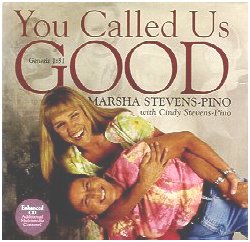
Yeah, it was actually fun. I had done a little gift thing for supporters that…what we did was we recorded a whole bunch of live concerts and then you know went to the studio and edited down so that it had stories along with the songs, you know, that interaction and stuff in between the songs as well as the songs. And I had a backer that liked that so much that he said if I would do it, a regular commercial CD that would include something like that, he'd back it. So Cindy and I did that. We went and kind of distilled down some of the stories that we tell about life on the road, or different things with the songs, and we did those along with the songs on the "You Called Us Good" CD. And then we also put a little bonus track on there for in the computer that has, you know, pictures of us through the years, has me singing "For Those Tears I Died" when I was 16, on Kathryn Kuhlman, and when I was 19 on the beach at Corona Del Mar, at 20, and 35, and 44 and whatever. So that was really, that was a fun album to do
Please tell me about the title track from "You Called Us Good"
The MCC in Toronto was trying to put together a theology that was…a positive theology that wasn't just, oh, we believe that God is love and so love is good, but that was a little more meaningful than that, and yet described some of the reasons that we feel that way. And as they were talking about it, they said that…they sent me the notes from all their meetings, they wanted me to write a song about it. And one of the things they thought about was that somehow in Christianity not only do Christians assume, but non-Christians assume that Christians assume, that a fundamental tenet of Christianity is that human beings are bad. And so fundamentally are evil and wrong and bad and must be saved and, you know, otherwise are going to hell, you know, all that stuff. And they said, you know, that one of the big things that we wanted to say was that, wait a minute, that's not how that started out. And it was really interesting because when I started…whenever I start writing a song I read versions of it to people to kind of see, is it making sense to you, do you see where I'm going with this, what don't you get, so that I can re-write it. And over and over again when I started telling people, you know, I'm writing a song "You Called Us Good," many people, knowing that I'm a Christian would say, "Yeah, but does the Bible say that?" I thought, oh my gosh, in the first chapter of the first book the Bible says that. But nobody seemed to know it so I thought, good, we'll just make that the title cut so they can't miss it.
Marsha Stevens - You Called Us Good (2005)
I know you've run into people in the Christian community not accepting you because you are gay, but have you run into gay people not accepting you because you sing Christian music?
Well, it's really funny, mostly when I'm interviewed by primarily, in primarily gay venues it's more like they genuinely say, "why would you want to be a Christian? Like, we don't get it. You know, those are bigoted, narrow-minded people that try to make everybody else as miserable as they are and try to live by a bunch of doctrines and rules that don't really, you know, apply to real life, and, why do you want to be one of them?" So, it's mostly that I find people puzzled and maybe put off, but I don't ever really find…I think there's a lot of Ecclesia-phobia in the gay community but there's not the same kind of hatred I don't think in the gay community that I run into that there is in the Christian community for the gay culture. Lots of people are just puzzled, why would want to go be a Christian for, that's weird. That's kind of a fun question to answer
Another way I had thought of phrasing that question was, How do you respond to the reality that so many gays have only negative associations with the word "Christian."
Yeah, I think that people respond to that in different ways. You know, some people say that I won't call myself a Christian, then I'll call myself spiritual or a believer, or whatever…I kind of feel like, and people have asked why I call my music born again lesbian music, like, why would I want to be associated with born-agains. And I just think, they don't get those words. I refuse to abandon them to the enemy, you know? I love those words, I love the idea that God gives us fresh starts all the time, so they don't get to have 'born-again,' I'm not letting them take it back. And I love the word Christian and I think that it really can have value to you and application in my everyday life. So, everybody has a different way of responding to it, I don't think there's a right or a wrong to it, but my response is, they don't get to steal those words. I still get to use them, they can't have them back. And, that's just me. Other people have different perspectives on that
Your first solo album was in 1987, has your audience changed over the years?
You know, it's changed a lot. At first, of course, like in '87. First of all it was very avant-garde for me to be doing what I was doing. People almost thought it was going to be a joke, like maybe there was going to be a Saturday Night Live aspect to it at the end. So the fact that I was actually serious about doing it kind of surprised people. Now there's enough people, you know, enough people that know what MCC is. There's enough people that have done various types of Christian music for the GLBT community. People aren't quite so shocked at the thought of it, at least where I sing they aren't.
But what's happened has kind of morphed and so for a while I was just like only singing to gay Christian organizations. And then I kind of went through a period of time where I was singing in a lot of gay venues, that were just trying to include spirituality, so I did a lot of gay prides, and did a tour of Mexico, did a tour of Australia, and both places thinking it would be these little tiny, you know, bring my guitar so I can sing in somebody's living room venue. And instead it was like I was visiting royalty. They had the amphitheatre full and, like, TV cameras there, and I thought "Oh my gosh," so then it kind of morphed into a whole, as different cultures began to reach out and try to understand more about the GLBT community, then I got to sing in more primarily gay places that were trying to bring spirituality into the picture. And then, in the last couple years there's been more and more what people typically refer to as mainstream denominations, like Disciples of Christ, Methodist, Presbyterian, Lutheran, American Baptist…
In what they call the Affirming churches?
Well, not all of them are affirming but all of them have some congregations within them that are affirming, and even the non-affirming ones started to book me in the last couple years. So the last couple years have been really a lot of mainstream Christian churches that have said, "Okay, well, we're not sure that we're really ready to deal with this yet, but come and sing and we'll just see what we think
What an opportunity.
Yeah, at first when I started doing it a couple years ago is what would happen, I'd show up someplace and basically their attitude was, "Well, we're letting them use our sanctuary," and then none of the straight people came. It was like, all the straight people said, "well, we're so open minded that we're going to let gay people use our church." But then one or two of the people would come, and over and over again I had like the music director or the pastor say, "wow, if we'd known it had been like this we would have invited the whole congregation." So then, like a year later I'd come back and they'd actually have me be at, you know, real church, instead of Sunday afternoon in the social hall for the gay people. So that's been really fun. I've actually really enjoyed singing for the mainstream churches.
They have a whole different set of questions. They're not really so entrenched in fundamentalism or, you know, specific interpretations of the scripture, but a lot of them are genuinely clueless about the gay community. You know, like they'll ask…sometimes I'll do a question and answer period and they'll really ask questions like "how do you get around the idea that, you know, men and women, you know, that how they have a relationship is just natural, it's just natural," and I have to work really hard not to laugh cause you can see every lesbian in the congregation kind of shudder, 'eh, natural, eek" but it's really interesting because they don't know that stuff or how we would respond to that kind of question, or what the thinking is in the gay community is about any of that, so, it's a whole different set of questions. It's kind of been fun.
From the album "The Waiting Is Over," please tell me about the title track.
Oh, "The Waiting Is Over" was an album I wrote almost entirely with my son. The title track actually was a runner-up in the John Lennon…in the John Lennon songwriting contest and they had a Christian segment of it. We actually got runner-up in that when it first came out. It was so much fun for me to be doing stuff with my son that actually sounded a little bit younger and more hip.
Marsha Stevens - The Waiting Is Over (1998)

What are your concerts like?
Mostly the way that I stay out of trouble is tell stories and sing songs about me and my experience, because basically how can you argue with that? You know, it's just me and my experience. When Cindy travels with me that's kind of fun because my spouse comes from a Catholic background and spent a long time literally homeless, literally an alcoholic, cocaine addict, living on the street with no other place to go. So, she now has, like, two masters degrees and has run a business of her own, has been clean and sober for 23 years, stuff like that. But she brings a whole different perspective to the concerts, because she actually became a Christian at an MCC, so…
Does she sing as well?
No, she doesn't at all, but she's really good story teller, and I write songs about her stories. So that's kind of fun because it brings a whole different, whole different perspective, and I find that a lot of people who are still kind of messed up with shame about the fact that they're addicted to drugs, or their drinking's out of control, or some other thing in their life is out of control. They don't end up feeling like they put her on quite the pedestal they put me on since I became a Christian so young, you know.
I saw you a number of years ago and I remember having two strong impressions walking out of it. One was that your concerts should be mandatory for every member of Congress…….and the other was that this is the definition of love.
Ah, that's so sweet, thank you. That's great. Well, basically I think that people…like I sang at Union Theological Seminary in New York City. Now there's a good example of like one of the places that is thrilled that I'm gay, because they are all about diversity. They were pretty wary about the fact that I would call myself an evangelical. You know, they didn't want me telling anybody they were going to hell, or trying to get anybody saved, or whatever. But it was really interesting because the President of the seminary and the Dean of women both came to the concert, and both of them cried. The President came up afterward and said, "You know, I left my Baptist roots behind long ago. I absolutely wasn't going to come to this concert, but you know, what, you just reminded me what it's all about." And I thought, "Oh, that's so great." You know, I guess that's part of my whole thing is that there is not a dichotomy. We think there is, and we've been told there is, but really, there's a reconciliation and there's a healing there, and it's not all about the differences
Is there any song that you've written of which you're the most proud?
Oh, golly, that probably changes all the time, you know, I have to think that I'm like most songwriters, and your latest is your favorite. I love "I Still Have a Dream" because it's something that gay choruses have picked up, and so it's kind of been useful to the community at large, and so that's really really nice for me. I'm always happy when "For Those Tears I Died" bridges a gap for somebody, sometimes it's just coming full circle. Like, there's this just sweetest guy, who when I first met him, he's clearly impaired in some way but you can't tell right, it's like he has a steel plate in his head, and he kind of walks funny, talks funny. And he finally cornered me in a place where I could understand his accent enough to understand what he was telling me, that when he was five years old he and his family were on a church camping trip, and they sang my song "For Those Tears I Died," and the whole family was singing it in the car and he remembers that song so vividly and how everybody loved it. And there was a car accident and the rest of his family was killed. And he, you know, had this brain damage, and plate in his head, and had to learn to walk again and whatever.
And all the years after he came out he kept thinking that if his family had lived and had known him, they might have been ashamed of him, or whatever. So when he met me and found out that I wrote that song, and that I was gay, it somehow brought him all the way back to, no, they would have loved me anyway, because they loved that song, you know, they would have seen that God loved her, and all that stuff. So that's always cool, when somebody just comes around full circle
Has your relationship with any of your earlier songs changed since you wrote them?
Yeah, there's some songs that I wrote before I came out that were very self-deprecating. You know, I'm such a heel, and I'm so low, and I'm so hopeless…and those kind of songs. I mean, I judge them tenderly, not harshly, I mean, I know where I was. I was, you know, feeling that I was disappointing God, and people around me. And that wasn't true, but I didn't know it then, so. But sometimes I'm sad to still hear other people singing them, cause I think, "oh, dear, didn't mean to encourage you in that area." I actually had somebody who, who turned in a song…we audition songs for other CDs sometimes, and try to encourage people who are just breaking into music, and give them a leg up. Somebody turned in a song that basically was sort of a sing-song, wasn't a great song to start out with. It was, you know, "for me to live as Christ and to die as gain, He's everything that I am, without him life just wouldn't be the same." But then the chorus was, "so kill me, kill me, kill me, now I'm dead." I thought, "oh my gosh, oh, I remember feeling that way." Poor girl.
It would make a great punk song.
Yeah I know, she really meant it, "so kill me, kill me, kill me, now I'm dead." Oh, poor girl, anyways. So yeah, those kind of things have changed, and mostly songs I wrote since I came out though, I pretty much, you know, that's who I am.
Tell me about BALM
Well of course it stands for Born Again Lesbian Music, which was a big controversy on both sides. And at first it was just an outlet for my music. It was just a way to publish my music, but…and then it broadened a little bit because there were other people who, you know, wanted to have music that was available that didn't have the time to put into it. Like for instance, a place called Christian Copyright Licensing, and churches can use the music from Christian Copyright Licensing for a very small fee, like a small church only pays $40 a year to use their music. And so there were individual writers who said, gee, I'd love to be there but I just don't have time to fill out all the paperwork. So, I said, oh gosh, sign up through BALM and I'll just pass all the royalties on to you, that's fine. And so it reached out a little bit that way, and then a few years ago we started periodically opening up CDs for audition, to either write or sing for, and that was kind of fun because people who had never been recorded had a song recorded, or people who had never been to a recording studio got to come in and have their first chance to do that. And what we do is BALM pays for the recording, so they pay for the artist to stay there, and food and lodging while they're in the studio, and the recording process, and all that goes along with that, printing and duplicating and everything. And then the artists who are on a project can buy those CDs at half-price and sell them at full-price to support their own singing
Is this the Upbeat program?
Well, it started out being just for people who auditioned to be on the CDs, but then we started a more formal program four years ago called Upbeat, and again did another CD that was opened up to auditions like that. But then we started doing kind of a training program where we brought different people with different kinds of experience, not just mine, to kind of teach people…people come to the program, there's only 6 to 10 people each year, so it's pretty individualized. Not everyone wants to be on the road full time but some people just want to learn how to put a band together, so we bring people together to help them do that. Some people sing at their own church, but they're just very stiff and they don't have any stage presence, and they don't know how to share. And so we bring in people to help them with that.
That's really been fun. One of our youngest members, who went through our first training four years ago just got his own recording contract in Nashville, and one of the songs on his CD got picked up by Walmart's country music…Walmart's country Christmas album this year. So, he's coming out November 24th in your local Walmart, with a whole bunch of other country artists on a Christmas CD
What's his name.
Justin Ryan. His picture's right on the front of the CD at the endcap of every Walmart. 65,000 Walmarts have pre-ordered it, so we're excited
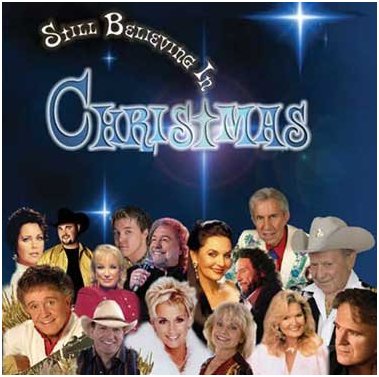
That's a terrific break.
Well, he gets ten cents a copy, so I'm all about that. I think that's great
And the song she's talking about by Justin is "He Would Be King"
Justin Ryan - He Would Be King (2006)
From his brand new album called "Surrender," that was Justin.
What is ahead for your own music?
Boy, I wish I knew. I'm not really, you know, I'm really good at writing music. I think I am a really good songwriter. I'm a fairly good singer. I'm by far not the best singer I know, but I'm okay at singing my own stuff. And as far as marketing or knowing what direction to push things, I just have no clue. I kind of go with the flow, and see what doors open up and…so, there's somebody right now doing a video…she's done other videos and she says she's going to do a video with me, that would be great, that would be fun. There's somebody…the guy who wrote the article for Christian Century has said that he would ghost-write a book with me. That would be cool. But you know, I don't know what will really happen
I'm going to play a song on my show by John Hocking, and I understand you knew him. Could you talk a little about him?
Oh, John, gosh. John was a young Baptist guy with AIDS. And he was so brave. By the time I knew him he was pretty ill, but he was just determined to put a loving face on the AIDS community. Everybody either had sort of a terror, at the time…you know, at the time, when John was living if you had AIDS you were dying. I mean, everybody died of AIDS, it was a terminal disease, that was it. So he was determined to put a loving face on it, but he was also determined to be really forgiving and conciliatory with his family, or with other Christians who were still really, really angry with the gay community. I think where my direction was more about reaching out with good news, and telling gay people, hey, you know, you're not left out, his was more about saying, in the deepest crisis no matter what's going on I still have joy, nobody's going to take that from me. So his testimony was very personal. It was really incredible. Are you playing "I'll Still Have Jesus"? One of his songs that was the last one that I heard him sing was "I'll Still Have Jesus," and it's just a song that says that basically no matter what happens, when all the world falls away, when all hell breaks loose, no matter who tells me I can't be there, no matter who tells me anything, I'll still have Jesus.
John Hocking - I'll Still Have Jesus (1992)

Welcome to Part 2 of my Gay Christian Music special, and I'll continue my interview with Marsha Stevens.
I know you didn't write this song, but you recorded it. Could you tell about the song "The Body of Christ Has AIDS"
Is that the greatest song? I wish I could find that guy. His name's Stuart Boardman, but his stage name was Christian Left, which I loved, Christian Left, isn't that great? And I heard him sing it at an MCC, and I thought, oh my gosh, this song has got to get out. At the time, you know, in the 90s it just seemed like every week I was asked to sing at a funeral, and I simply couldn't sing at all of them. And so I was looking for things that I could do that wasn't, you know, just about singing at funerals, and I loved that song, cause I thought, boy, does that just really put the truth out there. You know, it doesn't matter where I came from. And, I had a girlfriend, a lesbian girlfriend with AIDS, and people were constantly asking her how she got it. Now, a gay man they would never ask that, right? But somehow it showed that we still had this idea that of, wait, I just wanted to know if you deserved it or not, you know. Did you get it because you stopped and helped somebody at a car accident, and you got cut by glass and they were HIV positive, or did you get it because you used drugs? And it just made me so angry that people would ask that question, because there's the implication that there's some reason for you to know that, because you've got to make some judgment based on that information. And I loved that song because it just says, you know, it doesn't matter. I'm the body of Christ, we are the body of Christ, and we have AIDS.
I want to share with the original version of that song, "The Body of Christ Has AIDS," by Christian Left.
Christian Left - The Body of Christ Has AIDS (1995)
From your 1998 album "The Waiting Is Over" please tell me about the song "Lead This Pioneer"
That was a song for Troy Perry. Troy was just announcing the fact that he was going to be retiring, and there was a young man that was writing a musical, a script for a musical based on Troy's life, and they had asked me to write some music for it. That was the first song that I had written for the musical. I don't actually know what happened but the guy never wrote the musical, so that was just basically right out of Troy's book, you know, where he tried to kill himself, and people thought that he kind of knew what he was doing. And he was just saying then, I had no idea, it wasn't my plan, you know, I didn't wake up one day and, I know what, let me start a gay church. He said, I wasn't…there's a difference between being an explorer and being a pioneer, because an explorer is just out on their own, trying to figure stuff out on their own. A pioneer is trying to bring people with them, and he said that was the scariest part, was realizing that were he just an explorer he could kind of have the freedom to go anywhere and do anything and figure anything out, but where he was really a pioneer in trying to lead the way for other people, that put a whole different burden on him, so that was supposed to be the song from the musical.
Marsha Stevens - Lead This Pioneer (1998)
It was almost exactly a year ago that Rev Troy Perry retired after 37 years as moderator of Metropolitan Community Churches. I've got a special treat and definitely a piece of history to play for you. In 1973 an MCC church service was recorded and became a vinyl record album. From it is Rev Perry describing how the church started
Rev Troy Perry (1973, 7:30)
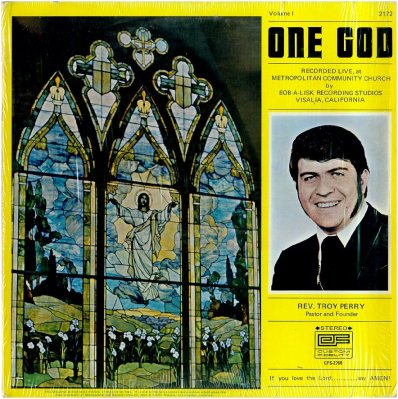
Another song I would like about from your album "The Waiting's Over" is "I Found You"
Well, I guess, as I've gone along, doing what I do, there's times of loss that happen over again, you know, like a few years ago Bill Gaither…Bill and Gloria Gaither, who are sort of the mom and pop of southern gospel music, and in fact, they won the ASCAP Songwriter's Award of the Century, not because ASCAP likes them best but because Bill & Gloria Gaither actually wrote and sold more songs in the 20th century than any other artist. And, so a few years ago Bill reached out to me from stage, introduced me from stage, and backstage was very warm and loving with me and with Cindy, my spouse, and caught endless flack for it. So at first there was this huge surge of wonder, and, isn't that great, from the gay community that he said something positive about us a few years ago, and then ultimately the backlash, especially online, got to be so great, and so many people had copies of what he said, and videos of it went out, and whatever…that Jerry Falwell got involved in it and ultimately Bill Gaither actually issued a statement against me. You know, not just saying, hey, I'm Bill Gaither and I don't believe in homosexuality, or I don't believe it's right. But he actually said, you know, Marsha misused that and misquoted me, and…I actually have the video, I didn't misquote him one word, but anyway…and, hers is a sad story, and all this negative stuff about me.
So along the way there's been things like that where it's sort of hard because some area looks like it's going to open up, and somebody from my past looks like they're going to reach out and really be able to make a connection. And then the door swings the other way and, you know, that sort of three steps forward two steps back thing happens, and it's so sad. So when I wrote "I Found You," it was just sort of a way of saying, you know, I refuse to grieve over the stuff that I've had to leave behind, because, you know, I'm just on my path and I'm doing what I do and I'm doing the same thing that I was doing in 1969 and 1970. You know, so, if other people have decided that they have another way to go, then I just need to look at what I've gained and not what I've lost.
Marsha Stevens - I Found You (1998)
From your latest album please tell me about "Wherever You Go"
Oh, that one's a song for my wedding. We got married when we could become legal spouses in Vermont. We planned this big wedding and Cindy's mom…although Cindy's mom has always said, I love you no matter what, but she was just really reticent to accept the idea of a wedding. She just didn't want to hear anything about it. And so I finally decided the way to get to her was to write a song that made her cry. So, I just thought, you know, every time I've heard the promises between Ruth and Naomi from the Bible read…they read those all the time at straight weddings, "wither though goeth I will go, wherever thou lodgest I will lodge, thy people shall be my people and thy God, my God," that was one woman to another, and every time I hear it at a straight wedding I want to go, whoa, that's our scripture, you go find your own, you know, go find "a man shall leave his mother and father and cleave to his wife" or use one of those, don't use ours, that's ours.
So I thought I'd have to have that at my wedding because nobody else can swipe it. And so I basically just wrote a song about Cindy and how she grew up in this big Catholic family, and went to everybody else's wedding. And, you know, was always the attendant, or whatever, as somebody else's wedding; always went to somebody else's house for Thanksgiving, somebody else's house for Christmas, you know, because she wasn't considered to have a family. So she grew up always being the fifth wheel, the guest, the bridesmaid, the whatever, you know, and I thought so here we are finally, finally where our society has said, nope, you don't have to be the outcast, you can be the one that has a family of your own, and that's the one thing that I can offer you because I'm pretty parapathetic, you know, I wonder around, I don't have a home, I don't have a lot of money, I don't have a lot that I can offer her, but I can offer her a family of her own. So, that made her mom cry, and so her mom came to the wedding, and sat in the front row, and gave her away. It was great.
Marsha Stevens - Wherever You Go (2005)
And also your latest album, please tell me about "A Future and a Hope"
That was so fun. I've been working with some people in Nashville, and it's been interesting to me…they have kind of no gay theology, but they have other reasons that they feel left out of church, cause they cuss, cause they chew, cause they're divorced, you know, cause they smoke, cause they drink, whatever, you know, for whatever reason they feel left out too. And it was kind of funny because I'd really sort of come to think of this being left out of church as a gay thing, and as I've been working with some of the people in Nashville I've realized how pervasive it is, how many people feel like they've been left out for whatever reason. And so while I was there I tried to come up with a song for the theme song for the general conference of MCC, which was "A Future and a Hope." We were talking about how Jesus was always talking to marginalized people, always talking to people that were left out. And the Bible kind of makes no bones about how human the people in the Bible are. You know, King David had sex with the guy's wife next door and then had the guy killed so that he could keep on having sex with her and not get caught, and you know, did all kinds of crummy things, but the Bible's pretty clear he did.
But anyway so while
I was in Nashville some other southern gospel artist did, I don't know,
something or other that people were upset about, so they weren't going
to sell this guy's CDs anymore and they weren't going to play him on the
Christian radio station anymore. But there was one bookstore in town that
kept on selling the guy's CDs. So the Christian radio station called this
bookstore on the air and said, "we heard you're stilling so-and-so's
CDs," and the bookstore owner says, "Yep, we are." And
they said, "you're going to have to tell us why. Didn't you hear
what he did?" He said, "Yep, I heard what he did and I'm still
selling his CDs, and you know what? I still sell the Book of Psalms, too."
I thought, oh, what a great answer! The Book of Psalms was written by
King David, most of the Book of Psalms was written by King David. So,
basically what he was saying was that, you, nobody that you have on your
bookshelves has done anything worse than King David did, and I still sell
the Book of Psalms, too. So, that's what we, that's how we came up with
that song, we decided, you know, the Bible is full of people that got
left out for social reasons, that God reached out and drew in, no matter
what.
Marsha Stevens - A Future and a Hope (2005)
Marsha Stevens QMH ID
Godspell - Day By Day (1972)
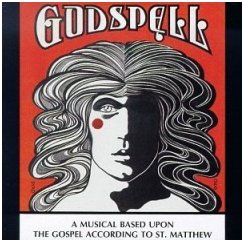
This is a good time to invite you to check out my website. If you visit it while you're listening you can see the playlist and follow along, while looking at photos of the artists and recordings. I've always considered our music history as a visual as well as an audio experience. I hope that you'll especially want to visit my site this month because this is another one of my super expanded shows. You'll be able to hear the much longer internet version with many more artists and comments. And it includes special interviews with Shawn Thomas and the duo Jason & deMarco. One of my goals this month was to pack as many GLBT Christian artists as I could into this feature, because I really want to try to do the subject justice. So on the internet version you'll be able to hear close to 50 additional artists. Again, that's at www.queermusicheritage.com, Also, for more very queer programming, please listen to After Hours with Jimmy Carper, every Friday night/Saturday morning from 1 to 4 am, on KPFT, it's Queer Radio, with attitude.
Oh, why am I playing the hit song "Day By Day" from the 1972 musical "Godspell"? Well, while I have no idea if the lead singer on that song, Robin Lamont, is gay, the writer of the musical certainly is. That's Stephen Schwartz, who went on to write other musicals you may have heard of, like "Pippin," "Children of Eden," "The Baker's Wife," and the recent hit "Wicked."
For the rest of the show I'm going to feature quite a variety of GLBT Christian artists, and one of things I realized while researching this project was that very, very few of the songs they record are actually lyrically gay. Now of course the reason is that God is their focus and not gay politics. But can you imagine a Queer Music Heritage show without lyrically gay music? I didn't think so. Fear not, up next is a handful of songs that fill the bill.
And the first one actually comes from a musical sponsored by the MCC Church in Dallas, in 1995. The musical was called "Coming Out, Coming Home," with the subtitle "A Lesbian/Gay Positive Musical on Love, Truth & God's Grace." Most of the songs were written by Stan Graner and he and Amy Mills sang this one, called "Lifted by the Power of Truth."
Stan Graner & Amy Mills - Lifted by the Power of Truth (1995)
From 1999 Tom Carlisle released a CD called "Follow Your Star," and from it is "Where There's God."
Tom Carlisle - Where There's God (1999)
Also from 1999 is JD Sebastian's album called "We Are Free." Helping him out on the title track is Luis Santiago.
JD Sebastian - We Are Free (1999)
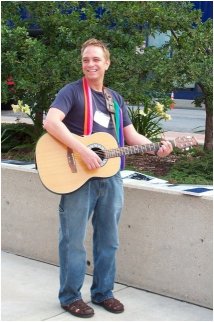
More in the folk vein is a group called Kadie O and the Light. Their album from 2000 called "Red October" included the song "Shepherd."
Kadie O & the Light - Shepherd (2000)
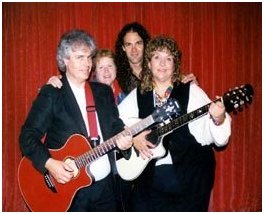
Several years ago there were two excellent websites on the net that featured recordings by GLBT Christian artists. The sites were Joyful Pride, and Pride Christian Ministries. Sadly they are no more, but one of the artists I found on those sites was Joe Warner. From his album from 2000 called "Worthy" is the song "The Agenda."
Joe Warner - The Agenda (2000)
I can't leave out this next song, and it's one of my favorites. This will mark the fourth time I've played it on Queer Music Heritage, and other than on my Xmas shows it's very unusual for me to repeat songs, because there are just too many songs I've not played at all yet. But as I said I can't resist this one. From the 1995 album "The Sacred and the Queer," here's Jallen Rix and "I Saw Jesus Down at Stonewall."
Jallen Rix - I Saw Jesus Down at Stonewall (1995)
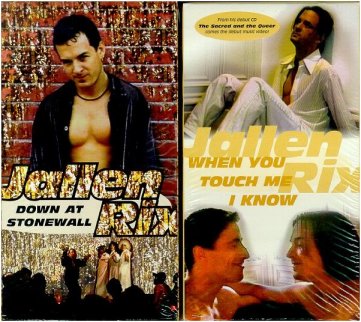
Just as I was writing the script for the show I got an email from Shawn Thomas, announcing his new CD, called "Faith Unashamed." And I was delighted to see that the CD contained a song called "Not Gay Enough for You." I called Shawn and got this comment about why he wrote the song.
Well, the song was I guess inspired from the past couple years that I've been touring through churches and not only to gay-affirming churches but also to some straight churches, and one of the things that I was finding was that not only were some of the more conservative and straight churches, or people from a conservative religious background having a hard time understanding someone who was gay, and also proclaiming their faith as a Christian. But I was also finding that to be true in the gay community, and that a lot of times the gay community doesn't accept faith or doesn't seem to Christianity as something that can be part of the gay society, whatever that is, quote unquote. I was getting expressions made to me saying that I wasn't being gay enough and that I wasn't being true to our society or our culture by expressing faith and expressing myself as a Christian. And so the song is meant to be tongue-in-cheek, in that's it's kind of a joke but at the same time it's got a message to it. And most of the time it seems to be received that way, at the churches.
Shawn Thomas - Not Gay Enough For You (2006)
Again that was Shawn Thomas.
Oh, incidentially, the piano music you've heard in the background under many of the interview quotes on the show came from the 2001 album "Prayer Circle," by Judy Blackwelder.
I'm down to the last song, but before I get to it I want to thank you all for listening, and I have a number of other people to thank. Of course first is Marsha Stevens, because it would not even had made sense to do this show without trying to capture some of her story. For those of you who visit my internet site you can hear more of this show including special interviews with Shawn Thomas, and Jason & deMarco. So I thank them, and I Terry Lee Ousley and Danny Riddle for providing me with their own music and the music of other artists. I thank my partner Jeff for his input and help in selecting songs. My internet show of course can be found at www.queermusicheritage.com. And, as always if you have questions or comments about any of the music I've featured, please write me. This is JD Doyle for Queer Voices on KPFT in Houston.
When I first got the idea a few months ago to do a show on Gay Christian Music, I immediately knew what my closing song would be. Because musically and lyrically to me it's the best song to capture what this show is all about. And logically, it's by Marsha Stevens.
My favorite of all your songs is "No Matter What Way".
That was really…that was a hard one to write, cause that the first time that I really used absolutely in your face queer language in a Christian song. I wasn't sure how it would go over.
How did it go over?
Oh, gosh, it was great. I've actually sung that with several gay choruses, and sang at a lot of pride events and stuff. The core idea for it came from a time when I was out with a bunch of church people visiting AIDS hospices on Christmas Day, and I guess that was sort of an odd thing. I didn't think of it as odd, but I guess people typically do it on a different day other than on Christmas Day itself. So, even though there's a lot of churches that do visitations, not a lot of them do it on Christmas Day itself. But we were just having a great time. We got to visit all these hospices and then we all stopped for lunch, and this guy came up to the table, from another table and said, "I just want you to know that I picked up your check. You guys just made my day." And we said, "oh my gosh, sit down, and you know, what are you talking about?" He said, "Nope, I don't want to join you, I was just sitting here feeling like bah humbug, I hate Christmas, everybody's a phony, and you guys just looked like you were so loving and having so much fun that I wanted to pick up your tab, so, why are you having so much fun, what have you done today?" We went, "um, visiting AIDS hospices." Anyway it turned out he was gay and his partner had AIDS and so it was just like so cool, but he had already picked up the tab. And so we went to church that night and whoever was doing communion said, "well, here we come to another table where somebody else picked up the tab." I thought, wow, what a great line, what a great way to see communion. Yup, we were having dinner and somebody else picked up the tab.
Marsha Stevens - No Matter What Way (1997)

Jeanie - Cover Me Lord, I'm Goin' In (2000)
Welcome to Part 3 my Gay Christian Music special. This is JD Doyle. Part one of this show actually has two versions. One is for broadcast radio as a part of Queer Voices, and is limited to about 58 minutes. But my interview with Marsha Stevens included many interesting comments that would just not fit into that time constraint. So for the internet version of it I split it into two parts. Therefore this is part 3, and that song gave a rousing start to this segment. That artist is Jeanie Cunningham, and the song came from her CD from 2000 called "Come as You Are to the Father." She records under several names; for that CD she was just listed as Jeanie, and she has two others going by Jae Cie, not the initials but spelled J-A-E C-I-E. It's all good. That song was called "Cover Me Lord, I'm Goin' In"
This segment will
feature lots and lots of GLBT Christian artists, including a special interview
with
Shawn Thomas. But first I want to insert a bit of queer music history.
Back in 1975 an artist named Valentino recorded a gay anthem called "I
Was Born That Way," and it was in a very R&B style. Three years
later, in the middle of the disco era Carl Bean updated it, and his version
went like this.
Carl Bean - I Was Born That Way (1978)
Okay, what's the connection to Christian music? Well, in 1982 Carl Bean was ordained as a minister, and in 1985 he founded Unity Fellowship Church, in Los Angeles. Also in 1985 he founded The Minority AIDS Project, which was the first community based HIV/AIDS organization established and managed by people of color. He's now known as Bishop Carl Bean and in 1998 he and the church released an album called "Right Now," with all proceeds going to assist minorities with AIDS. Here's the title track from "Right Now"
Bishop Carl Bean & the Unity Fellowship Church National Mass Choir - Right Now (1998)
In part two of this show you heard a group called Kadie O & the Light, from 2000. Well, I have a much older recording of hers in my collection. In 1991 she was in a group called Acoustic Souls and they had a cassette tape from that year called "Revelations Again," with this song, "Lift Him Up."
Acoustic Souls - Lift Him Up (1991)
Acoustic Souls, and you can also find that song on an album they released ten years later, in 2001, called "The Haze of Grace."
Sounbord - Oh What a Happy Day (1995)

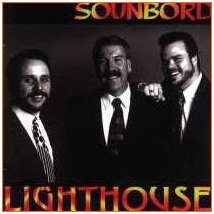
I
have their cassette, but they also had four CDs.
If you know where I can get copies, please let
me know


Following Acoustic Souls was a San Antonio quartet who went by the name Sounbord, and from their 1995 tape you heard the Dottie Rambo song "Oh What a Happy Day."
Going through more of my cassette tapes I found one from 1994 by Randa McNamara called "Reaching for the Freedom Inside." From it you'll hear a song I quite like called "Balm of Gilead," but it's not the tradional song by that title.
Randa
McNamara - Balm of Gilead (1994)
David & Jane - Not Ashamed of the Gospel (1993)
It wasn't an accident that I followed Randa McNamara and her version of the song "Balm of Gilead" with a song by a duo known as David & Jane. David & Jane wrote "Balm of Gilead" and their own cassette tape came out in 1993. They are a gay man and a lesbian and their full names are David Heid and Jane Syftestad. They are both ministers and composers. David directs the Voices of St. John's MCC and their album from 2000, "Anywhere With Jesus," was nominated for a GLAMA award. Here's a bit of the title track from that album.
Voices
of St John's MCC - Anywhere With Jesus (2000)
Lavender Light - Twelve Gates (1994)
The Voices of St John's MCC are out of Raleigh, North Carolina, and after them was a choir from Washington DC, called Lavender Light. Their subtitle is The Black and People of All Colors Lesbian and Gay Gospel Choir.
This next artist
lives in the panhandle of Texas, and does beautiful music. His name is
Kevin Jacobson.
He released his first CD, called "Beyond the Veil" in 2002 and
one reviewer wrote, "I get lost listening to the album 'Beyond the
Veil,' as if I'm slow dancing with God."
Kevin Jacobson - Heart to Worship (2002)
"Heart to Worship" by Kevin Jacobson.
Shawn Thomas Interview

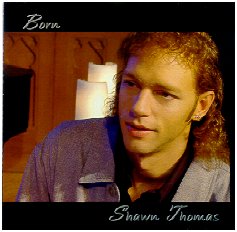

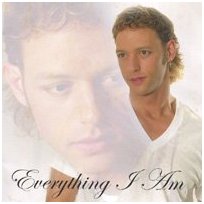
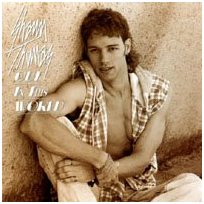

Time for the interview of this segment, and it's with Shawn Thomas. Shawn has recorded a number of albums since his first in 1993, but it wasn't until ten years later that he decided to incorporate his faith into his music, and released his first "spiritual" project, an album called "Everything I Am". His first project as an out or openly gay artist was released in 1999 and called "Out in This World."
Shawn Thomas - Out in This World (1999)
How did coming out change your music?
Well, obviously it changed my life. I just really felt much more free, once I even started talking about things out loud, and feeling comfortable with who I was, and those type of things. It did come across in the music. I had a CD that came out in 1999 that was called "Out In This World" and that was really the theme of that CD, was just feeling comfortable with who I was and the idea that I needed people in my life that made feel secure and that I could look to and feel comforted about that they were standing up for who they were, and so I was kind of encouraging other people to be there for others, so that they could do that too, whether it be because you're gay or straight or whatever. Everybody has things in their life that they sometimes feel fear about, about being true about who they are and what types of people they are and so, the CD was just about having the courage to stand up so that others can stand up with you
Which
song that you've recorded is the most lyrically gay?
[this question was asked prior to Shawn recording the song "Not Gay
Enough]
I can think of the
top three, I don't know about the most, though as I mentioned in '99,
the song, the CD that I came out on was called "Out In This World"
so that song, and as well on that same CD there's a song called "I
Found a Place," which is a ballad about coming out. "Everything
I Am" was the title to this CD that came right before "Changed,"
and that's definitely what it's talking about, too, that I am everything
I am because of who I am, not because of choices that I've made, is the
lyric to the chorus. So probably those would be the top three.
Well, people could say, that's not necessarily lyrically
gay, anyone could say, I am
what I am supposed to be
But that's a good thing. The ministry that I'm involved with is about the love and grace of God and I am gay so if I'm presenting, or have an opportunity to come to the church that has a gay congregation or people in it that are gay are going to relate to that experience in my life, then I talk about it. But some of the churches I go to are straight congregations, and that's not something they're going to relate to. Now I make sure that they are aware of who I am. I don't want to throw anybody off and have some surprises when I get there. So I don't live in the closet in that sense in the ministry, but that's not part of the ministry, that's not the focus, the focus is on God and grace.
And so I've had people for example on that "Everything I Am" song, I had a woman walk up to me one time, and she said that what that song meant to her was that she had been diagnosed with terminal cancer, and that that song to her meant "I am who I am, I am not the cancer." And that just spoke volumes to me because I had no intention of that when I wrote the song, and it just shows how God can speak to different people once I get out of the way, cause I don't really have anything to do with it. And so I just kind of present the music, and if different people can relate to it in different ways from their paths, that's a good thing
Shawn Thomas - Everything I Am (2003)
Tell me about your CD called "Changed"
The idea behind the "Changed" CD, the idea of that word in the title track was to use a different word instead of saying saved, because it's a word that I haven't always been really able to relate to. When people talk about being saved, a lot of times they talk about this instant transformation that's happened to them. And for me my journey and my walk with my relationship with God has been a gradual one and an ever-changing and growing thing that's happened over my life. And so the song talks about how I have changed. This is where I am now, and this is where I was. And it will keep going, you know, next year I'll say the same thing
Shawn Thomas - Changed (2005)
That was the title track from Shawn's album from last year called "Changed." That album was nominated for a 2006 Outmusic Award for "Outstanding New Inspirational Recording".
I really like your song that uses an arrangement of "Doxology"
Yeah, that was fun, I've had that in my head for years. I've always wanted to do an upbeat version of a song, some song, and I wanted to start it with an introduction using the Doxology. And so I've been playing around with it for a long time and never really figured out quite how to get into it and I really like how it turned out and it kind of has the story in the verses of letting to of the stress in your life, of let go and let God, that kind of expression, and then using the chorus to say "praise God from whom all blessings flow"
Shawn Thomas - Doxology (2005)
Have you met any resistance with people accepting you, and this could be two ways, the Christian community not accepting you because you are gay, and the gay community not accepting you because you are singing Christian music?
Yeah, both to those. I've had churches who won't have me come, because I am gay, and that's okay, that's their choice, and sometimes when I'm in a group of peers who happen to all be gay, if they didn't know who I was or what I did, they do have funny reactions to when they find out sometimes that I'm doing Christian music. And they ask questions about, like, well, do they know you're gay? Are you in the closet when you go to these churches? Or, where are you presenting this material? And so a lot of times it presents an opportunity to share with them about churches that maybe they didn't know about, and that they have places that they can go and worship. And so, I haven't had anything just terrible happen and I try to look upon everything as an opportunity. And so, that's an opportunity that presents itself…even the churches that turn me down, I think just the fact that I've introduced myself to them, somewhere in the future, that's going to make something open up for them.
There are so many gay people who have been through so much persecution because of religion that they have this wall that they've built
Sure, it's a natural
defense, absolutely, yeah. And I'm really blessed and grateful in that
my parents, I mean we've had our struggles with the whole issue of me
being gay, but it's never been one where they condemned me, to go to hell,
you know. They don't believe that, and so I never heard that, from my
parents, and I'm really really grateful for that, and again, what I hope
that I can portray is that, that's a misinterpretation that's not true,
God is not mad at anyone, and definitely not at anyone because they're
gay.
Shawn Thomas has just released a new CD, called "Faith Unashamed" and I'm very pleased to share with you the title track.
Shawn Thomas - Faith Unashamed (2006)
That was "Faith Unashamed" by Shawn Thomas.
Here's a lively song is by Sam Sampson. Over the years Sam has had ministries in various parts of the country but now lives in Nashville. He's got a couple of albums under his belt and from one called "You'll Tide Me Over" is "Paid Up, Prayed Up, and Ready"
Sam
Sampson - Paid Up, Prayed Up, and Ready
Prysm - Somebody Will (2002)
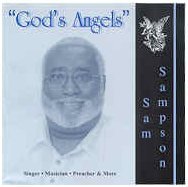

Following Sam Sampson was the group Prysm, and their song "Somebody Will," from their 2002 CD "Absolute Grace"
Rev Delores Berry has been at this a long time, since the early 70s. From the bio page of her website I love that the first sentence reads: "I am an out of the closet Christian Evangelist who Preaches, Prays, and Sings." And sing she does, since 1992 she's released four recordings, and here's a quick medley of three songs from them.
Rev Delores Berry - Why We Sing / Sign Me Up for the Rainbow Jubilee / God Put a Rainbow in the Sky (1995, 2005, 1999)
You just heard a bit of the songs "Why We Sing," "Sign Me Up for the Rainbow Jubilee" and "God Put a Rainbow in the Sky" and they span the last ten years of her music.
Blayne Bell - I Believe (2005)
That was Blayne Bell, and the song "I Believe" came from his album from last year called "Overcome."
And here's an energetic song by a group called FGS, For God's Sake, and they are from the All God's Children MCC in Minneapolis. The CD is from 2003 and is called "In The Moment" and the song indeed is "Joyful Joyful"
For God's Sake - Joyful Joyful We Adore Thee (2003)

Canaan - Church House (2006)
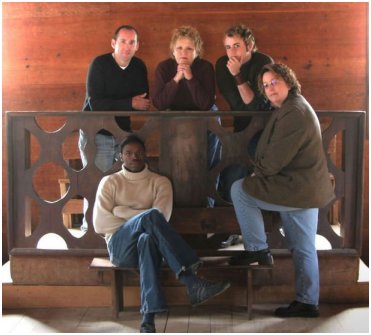
Thanks for sticking with me. This is JD Doyle with part 4 of Gay Christian Music, and that group is called Canaan. It's from their brand new debut album, called "Serious," and I can't resist playing a couple more tracks from the album, "Serious."
Canaan - Solomon's Song / I Am Free (2006)
By the band Canaan you heard "Church House," "Solomon's Song" and "I Am Free." One of that band's members is Melanie Wilkinson, and her recording career started 20 years earlier while she was living in Italy. From an album she released there, called "Just Mel," came the song "The Lord Be Magnified."
Melanie - The Lord Be Magnified (1986)
Up next are a couple songs that I think hold special meaning to our community. They were written by Jackson Myars, who was the founder and director of Positive Voices, a choir of HIV-positive men associated with The Cathedral of Hope, Metropolitan Community Church in Dallas. They were organized in 1994 and released two CDs and their second was nominated for a GLAMA award for 1997. As Jackson Myars died of AIDS in 2002, the songs are made all the more poignant. Here are the songs "Greater Than AIDS" and "Until It's Over."
Positive
Voices - Greater Than AIDS (1997)
Positive Voices - Until It's Over (1997)
Both of those songs were from the album "Until It's Over" by Positive Voices.
And from Dallas I go to Houston, for a beautiful version of the song "Most Holy One."
The Anointing - Most Holy One (2002)
That song was done by a group called The Anointing, associated with the Resurrection MCC Church in Houston.
Danny Riddle is a Florida singer who's been recording since 1981. He's released about ten recordings, making him one of the most prolific artists on this show. I want to share with you his very country 1981 song "I Should Have Been Crucified"
Danny Riddle - I Should Have Been Crucified (1981)
That was Danny Riddle, and next I want to share with you 1 ½ songs by him, and you'll see why I'm describing it that way, with the songs "I'm Going Up" and "If God Be With Us"
Danny
Riddle - I'm Going Up (2004)
Danny Riddle - If God Be With Us (2002)
Terry Lee Ousley - If God Be With Us (2003)
Okay, sharp listeners detected a change halfway through that last song, because I switched to another recording of the same song, by a different artist. The other artist is Terry Lee Ousley and what gave me the idea to do that was that he and Danny Riddle co-wrote that song, and it appeared on albums by each of them. It appeared on Danny's "In a Different Light" album from 2002 and Terry Lee's "Body Builders" album the next year.
Terry Lee Ousley, like Danny Riddle, is another artist who began recording many years before he came out of the closet. I've also got a short song of his from 1981 to play for you.
Terry Lee Ousley - I'm a Christian (1981)
I think that's charming. Doesn't that quench your musical thirst? Pass that Dr Pepper. Anyway, Terry Lee Ousley is another prolific artist, and he has wonderful harmonies on many of his songs, as you'll hear in this medley.
Terry Lee Ousley Medley - May the Gifts (2003) / I Give Up (2003) / Nothing Can Separate Us (2002) / We Won't Let Go (2003)
Those four tracks came from two of Terry Lee's albums released in 2002 and 2003, "Attitude of Praise" and "Body Builders," and something I find remarkable is that on the first three songs that was Terry Lee doing all the vocal harmonies. Now on that last track he did have some help on additional instruments and backing vocals. And one of the backup singers was Justin. During the Marsha Stevens interview section of part one of this show, she talked about Justin and I played his song "He Will Be King." You'll recognize this next song from his album.
Justin Ryan - Swing Low Sweet Chariot (2006)
Of course that was "Swing Low Sweet Chariot" and that was from Justin's debut album, "Surrender."
And I've got one more Justin song. Actually it's a duet with Shawn Thomas, and is found on Shawn's album "Revisited." I quite like this one. It's called "Get Up"
Shawn Thomas & Justin Ryan - Get Up (2006)
"Get Up," by Shawn Thomas and Justin Ryan.
This next CD covers a wide variety of material, including "Just Over In the Glory Land." The album is called "Going Places," and was released in 2005 by ex-lovers and still best friends Rick & Andy.
Rick
& Andy - Just Over In the Glory Land (2005)
Gospel Express Ministries - Mighty Savior (2002)
Following Rick & Andy were Randy and Sherry, but they went by the name Gospel Express Ministries in 2002 when they released their album "All Glory to God." Terry Lee Ousley produced that album, and I see his name crop up on many of the Christian CDs in my collection.
In part 2 of the show I played one of the few lyrically gay Christian songs. It was by Joe Warner and was called "The Agenda." Well, I've got another Out song by him, and I want to thank him for sending me his CD "Hope of Glory" in time to include the song in this show. From 2001 here's Joe Warner and "Beautiful Man"
Joe Warner - Beautiful Man (2001)
When researching this show I came across an old website for David North and his group Gospel Celebration, out of Washington DC. The CD from 1998 looked interesting, and I knew it had been nominated for a GLAMA award, so I ordered it. Well, three weeks later I was at the deadline for this show and no CD from the webstore that listed it. So I called David North himself to see if he could help, and left a message who I was and what I was working on, and he called me back. I turned on the recorder and asked him to comment on the title track for their CD, "I Am Not Ashamed." Now, remember, he was not planning to do a phone interview, but gave me these nice comments about the song.
That song was written with my life story in perspective, after…I'd pastored a Baptist Church, a thousand member church here in Washington, and was divorced, and HIV positive, and lost everything, found my wonderful partner…my partner's punching me in the back, saying, don't forget me…and we joined MCC after my whole world crumbled, and finally came to a realization that God knows what God is doing, and God made us who and what we are. And once I came to a love of of gratefullness for my sexuality, wrote that song. So it's written and sung with a lot of autobiographical passion. And so I'm very grateful. We were proud in the year 2000 to perform that song, "I Am Not Ashamed," at the Millenium March, on that stage…what was it? Like five hundred thousand people out there on the mall, here in Washington, and we were able to perform it live, and so we were very grateful we could do that.
David North & Gospel Celebration - I Am Not Ashamed (1998)
That was "I Am Not Ashamed" by David North and Gospel Celebration. On his website it listed the lyrics to all the songs they performed at that time and there was one that of course caught my eye, called "I Am Gay and It's Okay." I knew it wasn't on the CD and that they had not recorded it, but he started telling me about the song, and did so with an impromptu singing of it.
Do you have the lyrics in front of you?
Yeah, I can get
them, couple clicks away. Yeah, there it is, got them.
David North - I Am Gay & It's Okay (2006, from phone interview)
I do need to record it, that's kind of how it goes.
Can I air what you just sang?
Oh, my goodness, with the bits and pieces? Sure, absolutely. I'm really excited that you have this kind of a program, and whoever your listening audience is, I hope you have large listening if it can be a blessing and an encouragement to anybody
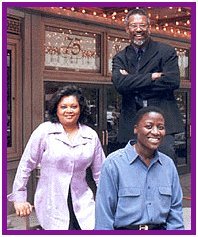
Well, David was a very good sport in letting me air that, and I definitely encouraged him to find a way to get a gospel group to record it. I can just imagine it with nice tight harmonies. I'd love it. I want to thank him for emailing me mp3 files to use on this show, of "I Am Not Ashamed" and this one, called "Justified," which kind of has a neat rap gospel thing going for it.
David North & Gospel Celebration - Justified (1998)

Rev Deanna Jaworski - Operator (1999)
Wasn't that a fun song? This is JD Doyle welcoming you back to, yes, it's part 5 of this special expanded edition of Queer Music Heritage. That was Florida artist Rev Deanna Jaworski, who has released several albums. From her 1999 album "Everything's Gonna Be Alright" you heard "Operator"
And another artist I heard on the internet, this time on Pride Christian Music radio on Live365, is Dale Jarrett. One from the album "Into His Presence" is called "I Give You Glory"
Apostle Dale Jarrett - I Give You Glory (2000)
That album by Dale Jarrett was released in 2000, but a few years earlier he recorded with a group called Witness, and they released two cassette recordings. Here is the group Witness doing "Hold On To the Gospel" from their "God Is Greater" album from 1992, and it will be followed by a song I find quite catchy.
Witness
- Hold On To the Gospel (1992)
Sherry Phillips - God Is a Good God
Singing "God Is a Good God" was Sherry Phillips, from her album "Songs for the Journey."
Now here's a group that, other than having their CD, I know nothing about them. They called themselves Reconciled and released an album in 1998, out of Tacoma, Washington. The liner notes barely gave the track listings and did not list the individual member's names. So, if you know about these folks, please drop me a line. Again, their name, and the name of this song, is Reconciled.
Reconciled - Reconciled (1998)
During the Marsha Stevens interview earlier in the show you heard her talk about the Upbeat Program, where they helped young Christian artists get started. One of the graduates of that program is Orgena Rose, and from her CD "Grace" is "Balm in Gilead."
Orgena
Rose - Balm In Gilead
Judy Cassidy - Just a Closer Walk With Thee (2002)
Following Orgena Rose was Judy Cassidy, from her 2002 album "I Believe," singing "Just a Closer Walk With Thee," and this next artist is a little mysterious.
Angel Blacker - Born Again (2000)
I described that artist as mysterious, but I do know a little about her, but not much. That track came from an album called "Breath of Heaven" from 2000. The song is called "Born Again," and I think it's pretty good. Her website is gone, and she's not on google, so I've no idea where you would find her CD. I don't have it. I got the song from a various artists album put out by Pride Chrisitan Ministries, called "Walk By Faith." And their website is gone.
One of the things I found when researching this project is that many of the artists just do not seem to stick around. Most of these projects were independently produced, in low quantites, with very little marketing, so I guess my advice is when you see a locally produced CD by GLBT Christian artists that you think you may want to buy, well, you may want to grab it when you can.
As I said earlier, Marsha Stevens and her Upbeat gang released a CD. It was called "Songs of Praise from a Strange Land," and includes the talents of 18 different artists, including of course Marsha and also others who have their own recordings like Terry Lee Ousley, Orgena Rose, Justin, and this artist, Cathy Bridges. On her album, from 2000, called "Renaissance" can be found the spirited song "I Choose You."
Cathy
Bridges - I Choose You (2000)
Beth Styles - Follow the Lord (2006)
After Cathy Bridges you heard Beth Styles, and I first found both those artists at CDbaby.com, one of my favorite sites. Beth is affialited with the New Haven MCC, and her CD, called "Glory" just came out this year. It was definitely a community project and I think it's excellent. To me it sounds almost like a Broadway musical, in that the various artists take their turns at center stage, and they are all talented. And it includes some special guests, like Rev Delores Berry, and Rev Franc Perry, who you'll hear right now.
Rev Franc Perry - Let Us Sing to God (2006)
Rev Franc Perry is affiliated with MCC's in both New York City and Atlanta.
I'm going to play three Houston artists next. And starting off the set is Allen Hanks. His debut release from this year is called "Not Like Mine" and the song is called "I Cannot"
Allen
Hanks - I Cannot (2006)
Alan Lett - From Now On (2004)
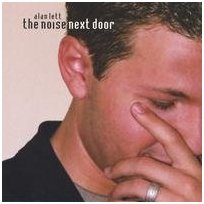
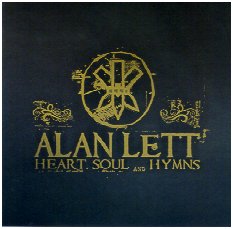
The album by Allen Hanks was produced by Alan Lett, who also produced the latest album by Jason & deMarco. The last song you heard came from his own 2004 album, called "The Noise Next Door," and featured guest rapper Ben Shallenberger.
Alan Lett has a new album, called "Heart, Soul & Hymns" and from it are these two tracks, called "I Can Only Imagine" and "Mansion Over the Hilltop."
Alan
Lett - I Can Only Imagine (2006)
Alan Lett - Mansion Over the Hilltop (2006)
Again, that was Alan Lett. And I promised three Houston artists. I opened part one of this show with Christian Andreason. This time I'm sharing with you a CD single he released in 2001 called "All the Time."
Christian
Andreason - All the Time (2001)
Marcus Young - My Heart's on Fire (2003)
I followed Christian Andreason with an Indiana artist named Marcus Young, and the song "My Heart's on Fire." He's released several recordings and that one was from his 2003 release "Heart's Fire."
Don Kennedy - Abide With Me (1997)
What a nice voice. That was Don Kennedy, from his mostly religious album from 1997 called "Come Home."
Now, you've probably been wondering, when am I going to play a version of "Oh Happy Day"? Well, right now, it will close segment 5 and it's really a group effort, a big group. It features the Transcendence Gospel Choir and the San Francisco Gay Men's Chorus. It's the title track for the CD they jointly released in 2004.
Transcendence Gospel Choir and San Francisco Gay Men's Chorus - Oh Happy Day (2004)

This is JD Doyle and you're listening to Queer Music Heritage. Welcome to part 6 of my supersized show on Gay Christian Music.
When choosing music for this show I tried to mainly keep to artists whose whole albums were spiritual in nature, but I do have to acknowledge that many excellent songs can be found on mainly secular recordings, so I have made some exceptions. These next two artists were both winners at the last Outmusic awards, and I love both of their albums. The first artist, Jen Foster, had an album called "The Underdogs" and I'm playing a song from it called "Amen." Now, this song won top prize in the USA Songwriting competition, in the gospel category and she's the first openly gay artist to do so. Jen Foster and "Amen"
Jen Foster - Amen (2005)
This next song is also one of my favorites. It's not even two years old and this will be the fourth time I've played it on QMH. The song is "Anyway You Need Her" by Nedra Johnson. The album it's from, just called "Nedra," won her the Outmusic award for Outstanding Female recording, and the song was up for Out Song of Year, losing to Jen Foster. On my September show I featured an extensive interview with Nedra and from that show I think it's worth repeating her own introduction to the song.
"Anyway You Need Her," so far it's been one of the songs that people have really responded strongly to, and it's about….from the way that I believe, and I do believe in God, so I just think that God would be whatever you need God to be when you need it. And if you need God to be her…if that's the only way you're going to hear the message, or you know like we all have somebody that comes in and offers a different perspective, and that person for me I can say, they've just brought a different voice, maybe just what I needed to hear. So all of that to me, I think of it as a blessing, so it doesn't matter what way that blessing comes, as long as you name it correctly. This is a blessing. And I think that a lot of the mainstream Christianity says, only this is from God, only the Bible and only the Bible we say, and only the interpretation we make, is what works. And I definitely like playing with irony around that kind of restricted belief, and I like also pushing the limitations on what anybody thinks about God. When I say Jesus is a lesbian, or Jesus is a fierce gay man, I know that's funny to people but I also do believe God is whatever I need when I need it, so there's the humor in it, but there's also the reality in it for me as well.
Nedra Johnson - Anyway You Want Her (2005)
Nedra Johnson and "Anyway You Want Her"
And here's another artist who was nominated for Outmusic Awards last year, Levi Kreis, and his album "One of the Ones" was one of my favorites of the year, but in 2002 he privately released an album called "Rough Around the Edges." It's out of print, you can't even get it at his site, but it contained a song called "Stain Glass Window," and I'd like you to hear it.
Levi Kreis - Stain Glass Window (2002)

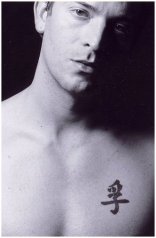
I first saw Levi perform "Stain Glass Window" in Los Angeles, after a production of the play "Southern Baptist Sissies," and I understand the song will be in the movie they are making of that show.
I've decided to include on this show three songs that are not truly Christian songs, but they are I think truly inspirational. The first one has been recorded many times, often by gay & lesbian choruses around the world, and one of my favorite groups, the Flirtations, have a wonderful version of it. But I'm playing you the original, by the gay artist who wrote it. His name is Labi Siffre and he is a black British poet, composer and singer. He had several hits in the early 70s but is most known for his 1986 hit "Something Inside So Strong."
Labi Siffre - Something Inside So Strong (1987)
That was Labi Siffre, and incidentally this year he and his partner are celebrating their 42nd anniversary together. For those wanting to do the math, they met when he was 19.
Tony Jones is the next artist and he is a visual artist in addition to a musician. He released a 5-song CD in 2002 called "Until Your Voice," and I fell in love with the title track.
Tony Jones - Until Your Voice (2002)
To me that was somehow spiritual without the lyrics hitting me over the head, in kind of a new age way. You won't find the album available on the net. Though he has a current website, Tony Jones seems to be quite elusive.
And the third song of this set is from a musical, one I've seen several times, called "The Last Session." It was written by Steve Schalchlin and the CD was released in 1997. It's music is good throughout but to me the stand-out song is "When You Care"
The Last Session - When You Care (1997)
In part one of the show you heard Marsha Stevens talk about part of her ministry where she works with young artists, and the first CD resulting from that came out in 2003 and was called "Songs of Praise from a Strange Land." One of the songs was the semi-politcal "Dare to Dream," written by Jallen Rix. Of course you can find that on his debut album, "The Sacred and the Queer," but this time it's sung by Michael Jansen and Jared Wengert.
Michael
Jansen & Jared Wengert - Dare to Dream (2003)
Carolyn Marshall - Healer in the House (2004)
That was Carolyn Marshall, and in 2004 she and Pat Grant released an album called "Songs from the Road," and it includes her own version of the Jallen Rix song "Dare to Dream."
What a nice voice. And another very nice voice belongs to Lee Ellis. In 1999 he released an album called "Michael," and Michael, by the way, was the name of an angel in one of the songs. From his CD I chose the song "Follow Your Heart."
Lee Ellis - Follow Your Heart (1999)
Up next is another black artist with a rich history, Gwen Avery. She appeared on the landmark album "Lesbian Concentrate" put out by Olivia Records in 1977, which was the first lesbian various artists album. But amazingly it wasn't until 2000 that Gwen Avery released her first official album, called "Sugar Mama." And no, "Sugar Mama" is not a religious song, but the album contains a song well worth including on this show, called "Precious Lord"
Gwen Avery - Precious Lord (2000)
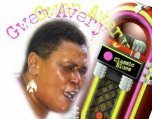
That was a little of the song "Precious Lord" by Gwen Avery. Helping out with backup vocals on that track was Linda Tillery, who helped produce the recording. She also appeared on the "Lesbian Concentrate" album and her own debut album goes back to 1970. But in recent years she's been more involved with the group she formed in 1992, the Cultural Heritage Choir. The song I chose from their 2001 CD "Say Yo' Business" may not be strictly religious, but it sure is uplifting and has been called the Black National Anthem. Here's "Lift Every Voice and Sing."
Linda Tillery & the Cultural Heritage Choir - Lift Every Voice and Sing (2001)

Yes, I guess this is becoming a marathon. I didn't plan it that way, but once I began researching this project I was amazed at the richness and variety of the music and the message, and I kept finding more and more I wanted to share. So, this is JD Doyle and welcome to part 7 of what's become eight hours of the music of GLBT Christian artists. And this segment includes a very special interview with Jason & deMarco. But first up is Christopher Hoffman, who released an album called "The Road" in 2002, and you'll hear the title track.
Christopher
Hoffman - The Road (2002)
Joe Simmons - Time and Space (1994)
Christopher Hoffman's song "The Road" was followed by Joe Simmons and a song called "Time and Space." That was from his 1994 album "Singing Out." The song was written by New York area singer songwriter Tom McCormack, and Joe Simmons must have been a big fan of Tom's as he covered two of his songs on the album.
And that brings me to the music of Tom McCormack himself. In 1991 Tom released a cassette called "Running With Light," which I thought was extraordinary. In fact I was one of the people who strongly nudged him that he really, really needed to make it available on CD, which he did in 2001. It was hard for me to pick one song from that recording, but for this show I think the song "All That I Am" will give you a good impression of the album.
Tom McCormack - All That I Am (1991 & 2001)
Tom McCormack and "All That I Am" from the album "Running With Light"
Jason Warner - Amen (1999)
That was Jason Warner, from his 1999 album "Only a Whisper. He's now part of the duo Jason & deMarco, and I think they are amazing. And it's been interesting to watch their career over the last several years. Before they got together they both had released solo albums, but together their voices are, well, heavenly. I've interviewed them twice, in 2003 and 2005, so it is interesting to see their progress, but first I want you to hear one of their songs. I'll let Jason introduce the song "It Is Well," which comes from their 2003 album, "Songs For the Spirit."
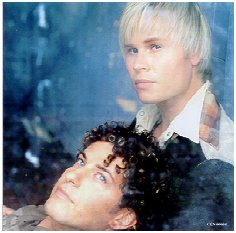
[Jason] "It Is Well" is definitely a favorite in our concerts. "It Is Well" is obviously a cappela, and it's an arrangement that I put together for deMarco and I to sing. Originally we were going to have a third part in it, and it ended up going so well with just the both of us. It's one of the favorites out there. What more can you say than, regardless of everything you've been through and that we've been through, it is well with my soul.
Jason & deMarco - It Is Well (2003)
I asked them about their background. Jason went first
[Jason] I was raised in a Pentecostal background, and went to Lee University, which at the time I went was Lee College, and that's a Pentecostal Church of God based college. And I had been raised singing my entire life, since I was a kid, and my parents actually…we started going to the Church of God I guess when I was around 14, and I ended up going to their college, and I had always felt the desire to sing and I had basically been reared to be the next Christian male solo artist. And everybody kind of expected that, and that's the direction that I was planning on going. So I went to Lee, and I graduated and I ended up traveling with a band, in the mainstream Christian market. And I was with them for about a year and upon coming out I was invited to get out, of the group. And so I went at that point on a very serious spiritual search trying to figure out who this God was that I had been raised to believe in. I'd always believed in a God of love, and acceptance, and suddenly I was faced with being rejected by everyone that I pretty much relied on and considered my brothers. So I went on a very…a quest, a soul search of trying to figure out how I could reconcile these issues. And it wasn't long after that that I was given the book "Stranger at the Gate," by Mel White. And after reading that book I was amazed at his story because it was so similar to my own.
And I basically…I had no idea there was such a thing as affirming churches, and so at that point I started contacting affirming churches, and the first church to get back to me was based out of Ft. Lauderdale, Florida, the Sunshine Cathedral MCC. MCC is Metropolitan Community Church, and that denomination was actually formed by Troy Perry, who was also kicked out of his church thirty-something years ago. And he basically said, nobody can keep us out of church just because of our sexuality and they started meeting in a living room. I found out about that denomination. I found out that there's a lot of other denominations that are now affirming, and it really opened a whole new…a whole new way of life for me and a whole new possibility, that I may be able to actually continue with my call, and actually do what I felt I was meant to do in my life, and I ended up going to Ft. Lauderdale and sang at that church, the Sunshine Cathedral, that contacted me. The first time I walked through those doors I understood what unconditional love meant. I understood that it wasn't about them telling me I needed to live or be a certain way, but it was simply me going in there and being loved unconditionally. And it was the first time that I had ever experienced that. They just said, you know, we'll love you and you can learn in your own way and search things out for yourself. And it wasn't long after that, in three months, doors started opening for me to go into other churches, and that was four years ago (1999) and I've been touring full time every since. It's been four years in November (2003).
And now we'll hear from deMarco
[deMarco] I grew up in an Italian city north of Toronto, in Canada, called Woodbridge. I went to a school for the performing arts to continue my interest in singing, and I actually was interested in opera for a few years and studied classically and then discovered my roots. My parents are Italian and I recorded an Italian album that Sony Canada manufactured. And I traveled for a bit with a band up in Toronto and five years ago I decided to move to Los Angeles to make it in the movies and as a singer. And I met Jason…two years ago? [oh, he's in trouble] We met two years ago, and he was doing his own thing, travelling in his ministry, and I was kind of doing something a little different. I was doing a few night club performances a year and trying to get into theatre and doing television commercials.
And we decided a little over a year ago that we were going to do something together. And we decided to do a Christmas tour, cause we thought, what better way to combine out talents and our backgrounds in music than to do something Christmas, cause usually everyone likes Christmas. We could do it in churches. We could do it outside of churches, in theatres.
We recorded our Christmas album and we did 23 cities in the month of December, and everytime we visited the church these churches asked when we were going to be coming back, and initially we had not planned to continue to travel together, it was just supposed to be a Christmas tour, we decided that since the opportunities were coming our way, to kind of combine forces and do this together. And so it looks good, and we've been very lucky and we've been having a great time.
Remember these comments are from 2003 and next they'll talk about their album "Songs For the Spirit" and then they'll talk about where they want to go next
[Jason] Our CD is…this isn't the direction we were actually planning on going, but when we started travelling we recorded a Christmas album. It was our first project together. And when we decided to continue to travel together I had already been appoached by several people several times that people wanted an oldies but goodies, a favorites album, with the traditional hymns and praise and worship songs. And then I had written some original material and I wanted to go ahead and put that on it. I had already had several sponsors come in that had put funds up to do that album. And so "Songs for the Spirit" is actually that album, and it is the traditional hymns and praise and worship songs that we put together, and then it has some original material on it as well.
Stylistically of course it's piano and vocals only and it's very traditional. The arrangements are all new arrangements of the songs, and we tried to make them as contemporary and fresh as possible, but the style that we are actually attempting to go toward is more of a crossover style, where it's not necessarily considered Christian music, but that it has a spiritual appoach so that it reaches across, specific spiritual boundaries, so that it reaches across and it can, you know, whether your Muslim, whether you're Jewish, whether you're Christian, when you're listening to it people can relate to it, and it has a universal language of love and acceptance without having to get religious. And we basically call it, it's Spirit Pop, and it's music with a positive message and underlying a spiritual message, but it has the capability of reaching across those boundaries
[deMarco] Basically with the album that you have there, "Songs for the Spirit," you will get vocally what Jason and I are in terms of the harmonies, but definitely "Spirit Pop" is our next project, and we are currently working on new songs, writing our original material and collaborating with some well-knowns for this next album, which we hope to release the following year
From their 2004 album "Spirit Pop," is the song "All I Long For"
Jason & deMarco - All I Long For (2004)
Who is your audience?
[deMarco] Basically everyone, we hope to reach young people, old people, definitely the GLBT community, but also, you know, the heterosexual community. We don't make being gay a big issue. We are not advocates but if people ask we are honest, and…
[Jason] We don't use our music as a political platform, this is Jason, we don't use our music for a politcal platform. We want our music to reach all people
Is it important for you to be Out as performers?
[deMarco] It's not important for me to be out in terms of, look everyone, I'm a gay singer. Jason and I are a couple. We are two singers that so happen to be gay, and we don't like to make that the big issue, but we are also truthful about who we are and if asked we wouldn't lie, you know, on radio or on television or in the media
[Jason] Our sexuality is a very small part of our life, and we've been extremely blessed to find each other and to not only have life partnership but to have a business partnership. And we're very fortunate. We do have a stong desire to be role models for those out there, for young people out there. We have a huge desire to reach young people through our music and to particularly reach young people in the gay community, that they can see that there is a possibility of being young, of being spiritual, and of being in a relationship. That's something that many question in our community, and we've been very fortunate to meet so many wonderful couples, so many wonderful people out there that not only had relationships, and healthy relationships, but very long term relationships
[deMarco] There are a lot of young hurting people in our community, and I think it's nice for them to see that there are alternative life styles in the gay community, other than drugs and liquor and circuit parties and the bars. And I think often, at least we are told through letters and emails that people send us, that we've shown them that there is another side, a healthy side
Okay, let's move ahead to 2005, and when they came to Houston for a concert I got the chance to ask about the next project. They were working on the new album, which did not even have a title yet.
[Jason] The new album is…we're wanting to go in a direction of reaching a broader audience than up until this point we've done with our music, and it's creating…it's definitely more mainstream, leaning more towards a pop rock sound. And we want to still have positive lyrics throughout the music, but it's more about real life. It's real life, real relationships, and then also bringing elements of spirituality into it.
How is the new album different from "Spirit Pop"?
[deMarco] "Spirit Pop" was still a little bit inspirational, and maybe a little too, you know, foo foo, or fluffy for us. You know, as an artist you kind of tend to always think ahead with your new work and what's the new sound, and where is music going, and always trying to be on top of the new trend, or setting new trends, so this new album is really goind to be, like Jason said, pop rock, varied, a lot of acoustic drums, acoustic guitars and…
[Jason] "Spirit Pop" was mostly a lot of tracking in the studio, whereas the new album is all live instrument, it's a full band sound, and it also too…"Spirit Pop" to a lot of people has a sound of, you know, Christian Contemporary Music, has a sound, or Contemporary Christian Music, has a sound. And "Spirit Pop," the sound is so different and so unique, you know, that the music sounds very different but yet our vocals are still there, so it's still very much Jason & deMarco, because of the harmonies and the vocals. So we pulled our vocals into a new sound of music
[deMarco] This new album is definitely going to be a lot edgier than "Spirt Pop"
And I agree with
that. It's an excellent album. It's called "Til the End of Time"
and here's the track, "Trying to Get to You."
Jason & deMarco - Trying to Get to You (2006)
You heard deMarco say the new project would be a lot edgier. Well one example of that is the CD maxi-single they released with a number of remixes of that last song, like this one
Jason & deMarco - Trying to Get to You (remix) (2006)
Now, while they are definitely trying to get their music to you, and the mainstream, they have not forgotten their Christian music roots. They have a brand new release called "Halo." This is a little like a stock split, they are so talented they can go ahead in different directions at the same time. From that album is the song "When Your Spirit Gets Too Weak."
Jason & deMarco - When Your Spirit Gets Too Weak (2006)

Again, that was "When Your Spirit Gets Too Weak," from the brand new album by Jason & deMarco called "Halo." Actually this show is airing a few weeks before that album is being released, so I thank Jason & deMarco and their producer Alan Lett for getting that track to me early, so I could include it.
We're down to the last song of the show, I know, finally, and again, I'm JD Doyle and I want to thank you for sticking with me through this super sized edition of Queer Music Heritage. While I got to include about 70 different artists and groups in this show, I'm sure there are a number of GLBT Christian artists I didn't know about or was able to get their recordings. But I hope what I have found gives you a good sense of our history, and future, in this genre of our music culture.
For the last song of this special series naturally I wanted something special, and I didn't have much trouble picking this one. It's by the Transcendence Gospel Choir, and yes, they are the group I used to close the last segment. They are out of San Francisco and are the first all transgender choir. Their debut album, from 2003 won the Outmusic award that year for Outstanding Recording by a Chorus of Choir, and they've since released an album joined by the San Francisco Gay Men's Chorus. But from their first album the song I've been saving for you is this one, "Safe in the Arms of Jesus."
Transcendence Gospel Choir - Safe in the Arms of Jesus (2003)
70 ARTISTS, 108 SONGS, Whew!
